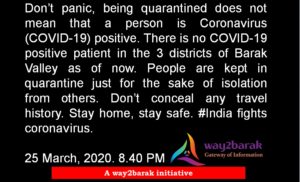Barak UpdatesIndia & World UpdatesAnalyticsBreaking News
Punishment for violating Lockdown, writes Dharmananda Deb

March 25: As per the guidelines issued by the Ministry of Home Affairs on the 21-day lockdown, people violating it can face punishment that may include a fine from Rs 200 to Rs 1,000 or imprisonment from one month to two years or both, depending on the severity of disobedience. These orders are imposed invoking the powers under Epidemic Diseases Act, 1897 and Disaster Management Act 2005. On the top of it, District Magistrates have imposed prohibitory orders under Section 144 of the Code of Criminal Procedure in several districts. Here are the legal provisions that may be invoked to punish the violators:

If you violate Section 144 of Cr.P.C:
Several Districts across the country have imposed Section 144 of Cr. P.C. to enforce lockdown. This Section is used to prohibit public gatherings and a gathering of over four people is deemed “Unlawful” under this Section. It means, if Section 144 has been imposed in your District, you cannot organize or attend any mob or protests etc.
If you violate the above mentioned fact then you can be booked for “engaging in rioting”. The term ‘rioting` defined under Section 146 of IPC and if you guilty under section146 then you shall be punished with imprisonment of either description for a term which may extend to two years, with fine, or with both under Section 147 of IPC.
On the other hand, if you are found guilty of rioting being armed with a deadly weapon or other weapon is likely to cause death, shall be punished with imprisonment of either description for a term which may extend to three years, or with fine, or with both under Section 148 of IPC.

Section 188 of IPC : If you disobey the Order duly promulgated by Public Servant:
Section 3 of the Epidemic Diseases Act 1897 states that violation of regulations issued under the Act will be an offence under Section 188 IPC. There are two limbs for Section 188. The first limb of the offence deals with disobedience causing or tending to cause “obstruction, annoyance or injury, or risk of obstruction, annoyance or injury, to any person lawfully employed”.

From the point of view of health emergency, the second limb of the offence is relevant, which deals with disobedience causing or tending to cause “danger to human life, health or safety…”.The said offence is punishable with simple or rigorous imprisonment which may extend up to six months, or with fine which may extend to one thousand rupees, or with both.
 As per the explanation given to the Section 188 of IPC, it is not necessary that the offender should intend to produce harm, or contemplate his disobedience as likely to produce harm. It is sufficient that he knows of the order which he disobeys, and that his disobedience produces, or is likely to produce, harm.
As per the explanation given to the Section 188 of IPC, it is not necessary that the offender should intend to produce harm, or contemplate his disobedience as likely to produce harm. It is sufficient that he knows of the order which he disobeys, and that his disobedience produces, or is likely to produce, harm.
The offence is cognizable and bailable. However, for the Court to take cognizance of the offence (including abatement, attempt or conspiracy for the commission of the offence), there has to be a complaint in writing by the concerned public officer as per Section 195 Code of Criminal Procedure. In other words, the Court will not take cognizance of the offence merely on the basis of an FIR.

Section 269 IPC -Negligent act likely to spread infection of disease dangerous to life:
If a person unlawfully and negligently does any act which is and which he knows or has reason to believe to be, likely to spread the infection of any disease dangerous to life, shall be punished for the offence under Section 269 Cr.P.C. This is punishable with simple or rigorous imprisonment which may extend up to six months, or with fine, or with both. The offence is cognizable and bailable. The offence is not listed as a compoundable offence under Section 320 of the Code of Criminal Procedure.

Section 270: If you violate lockdown:
This is a more serious variant of Section 269 of IPC. If a person malignantly does any such act and committing any act with the knowledge or reason to believe that such act is likely to spread any infection or any disease, dangerous to life, then he shall be punished for the offence under Section 270 I.P.C. The offence under Section 270 is punishable with imprisonment of either description for a term which may extend to two years or with fine or with both.

Section 271: If you disobey the quarantine rule:
If you have tested positive for the virus or are a suspected case currently under quarantine then violating restrictions or rules can land you in trouble. Section 271 of IPC deals with the offence of “disobedience of quarantine rule”. This is punishable with simple or rigorous imprisonment which may extend up to six months, or with fine, or with both. The offence is non-cognizable and bailable. The offence is not listed as a compoundable offence under Section 320 of the Code of Criminal Procedure.

Besides Section 3 of the Epidemic Diseases Act 1897 and several penal sections under Indian Penal Code, the Disaster Management Act, 2005 has also provisions creating penal offences.
Section 51 of the Disaster Management Act, 2005 is similar to Section 188 IPC, dealing with obstruction of performance of duty by public officer, and refusal to comply with any direction given by the authorities. The violators shall be punished with imprisonment for a term which may extend to one year or with fine, or with both, and if such obstruction or refusal to comply with directions results in loss of lives or imminent danger thereof, shall on conviction be punishable with imprisonment for a term which may extend to two years.

Sections 52 of the Disaster Management Act, 2005 deals with making of false claim. According to this Section, whoever knowingly makes a claim which he knows or has reason to believe to be false for obtaining any relief, assistance, repair, reconstruction or other benefits consequent to disaster from any officer of the Central Government, the State Government, the National Authority, the State Authority or the District Authority, shall, on conviction be punishable with imprisonment for a term which may extend to two years, and also with fine.
Sections 54 of the Disaster Management Act, 2005 deals with false alarms/warning over disaster leading to panic. According to this Section, whoever makes or circulates a false alarm or warning as to disaster or its severity or magnitude, leading to panic, shall on conviction, be punishable with imprisonment which may extend to one year or with fine.

Sections 59 of the Disaster Management Act, 2005 lays down the provision regarding previous sanction for prosecution. According to this section, no prosecution for offences punishable under sections 55 and 56 shall be instituted except with the previous sanction of the Central Government or the State Government, as the case may be, or of any officer authorised in this behalf, by general or special order, by such Government.

According to Section 60 Disaster Management Act, 2005, complaint in writing by the authorized officer is necessary for the Court to take cognizance of the offence.
In conclusion, as the PM of our country said, the problem is serious and people should understand that to remain safe we need to stay in our homes. If we come out, the virus will enter into our house. We also need to keep in mind that we cannot leave our home without prior police permission during nationwide lockdown period.




